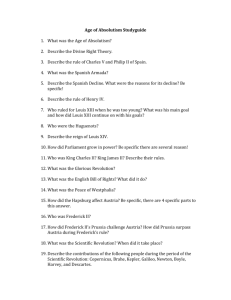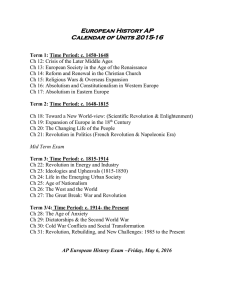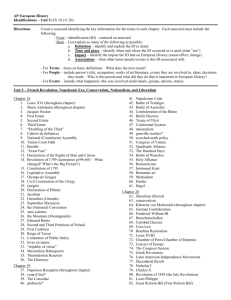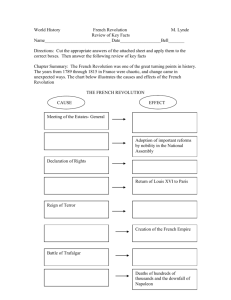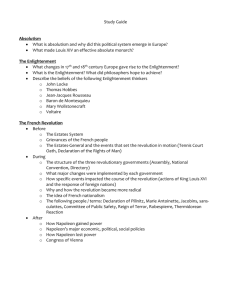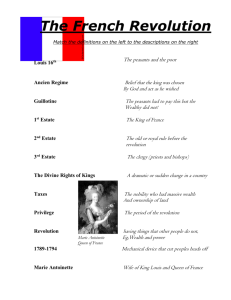17-21 French Revolution to Enlightenement
advertisement
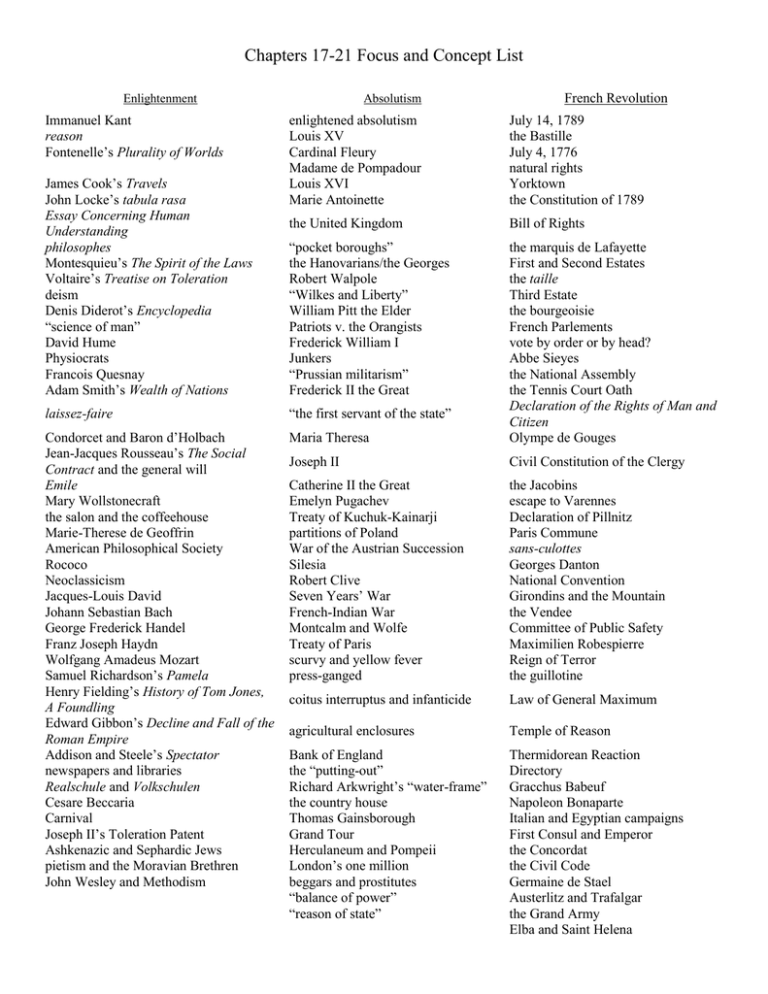
Chapters 17-21 Focus and Concept List Enlightenment Immanuel Kant reason Fontenelle’s Plurality of Worlds James Cook’s Travels John Locke’s tabula rasa Essay Concerning Human Understanding philosophes Montesquieu’s The Spirit of the Laws Voltaire’s Treatise on Toleration deism Denis Diderot’s Encyclopedia “science of man” David Hume Physiocrats Francois Quesnay Adam Smith’s Wealth of Nations Absolutism French Revolution enlightened absolutism Louis XV Cardinal Fleury Madame de Pompadour Louis XVI Marie Antoinette July 14, 1789 the Bastille July 4, 1776 natural rights Yorktown the Constitution of 1789 the United Kingdom Bill of Rights “pocket boroughs” the Hanovarians/the Georges Robert Walpole “Wilkes and Liberty” William Pitt the Elder Patriots v. the Orangists Frederick William I Junkers “Prussian militarism” Frederick II the Great laissez-faire “the first servant of the state” Condorcet and Baron d’Holbach Jean-Jacques Rousseau’s The Social Contract and the general will Emile Mary Wollstonecraft the salon and the coffeehouse Marie-Therese de Geoffrin American Philosophical Society Rococo Neoclassicism Jacques-Louis David Johann Sebastian Bach George Frederick Handel Franz Joseph Haydn Wolfgang Amadeus Mozart Samuel Richardson’s Pamela Henry Fielding’s History of Tom Jones, A Foundling Edward Gibbon’s Decline and Fall of the Roman Empire Addison and Steele’s Spectator newspapers and libraries Realschule and Volkschulen Cesare Beccaria Carnival Joseph II’s Toleration Patent Ashkenazic and Sephardic Jews pietism and the Moravian Brethren John Wesley and Methodism Maria Theresa the marquis de Lafayette First and Second Estates the taille Third Estate the bourgeoisie French Parlements vote by order or by head? Abbe Sieyes the National Assembly the Tennis Court Oath Declaration of the Rights of Man and Citizen Olympe de Gouges Joseph II Civil Constitution of the Clergy Catherine II the Great Emelyn Pugachev Treaty of Kuchuk-Kainarji partitions of Poland War of the Austrian Succession Silesia Robert Clive Seven Years’ War French-Indian War Montcalm and Wolfe Treaty of Paris scurvy and yellow fever press-ganged the Jacobins escape to Varennes Declaration of Pillnitz Paris Commune sans-culottes Georges Danton National Convention Girondins and the Mountain the Vendee Committee of Public Safety Maximilien Robespierre Reign of Terror the guillotine coitus interruptus and infanticide Law of General Maximum agricultural enclosures Temple of Reason Bank of England the “putting-out” Richard Arkwright’s “water-frame” the country house Thomas Gainsborough Grand Tour Herculaneum and Pompeii London’s one million beggars and prostitutes “balance of power” “reason of state” Thermidorean Reaction Directory Gracchus Babeuf Napoleon Bonaparte Italian and Egyptian campaigns First Consul and Emperor the Concordat the Civil Code Germaine de Stael Austerlitz and Trafalgar the Grand Army Elba and Saint Helena Industrial Revolution Reaction, Revolution, Romanticism Industrial Revolution agricultural revolution Richard Arkwright’s water frame James Hargreaves’ spinning jenny Samuel Crompton’s mule the cottage system James Watt and the rotary engine Henry Cort and puddling George Stephenson’s Rocket railroads the factory Congress of Vienna Klemens von Metternich “legitimacy” balance of power Edmund Burke and conservatism Joseph de Maistre and conservatism Concert of Europe the congress system Latin America revolts Monroe Doctrine Greek Revolt factory discipline Britain’s Tories and Whigs Great Exhibition of 1851 Corn Laws and the Peterloo Massacre the Crystal Palace Louis XVIII and Charles X the Great Famine suburbs Edwin Chadwick cholera child labor Robert Owen Luddites Chartism and the People’s Charter Ten Hours Act of 1847 Coal Mines Act of 1842 the Poor Law of 1834 Germanic Confederation Burschenschaften the Decembrist Revolt Tsar Nicholas I John Stuart Mill On the Subjection of Women utopian socialism Charles Fourier’s phalansteries Louis Blanc and Flora Tristan France’s July Revolution of 1830 revolutions of 1848
